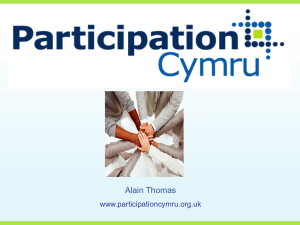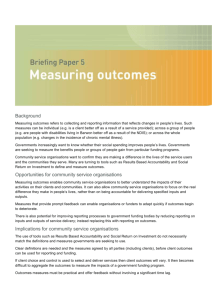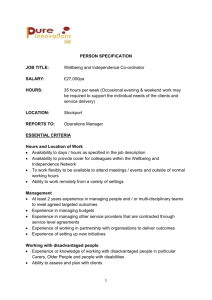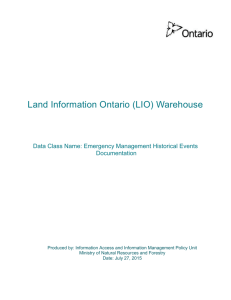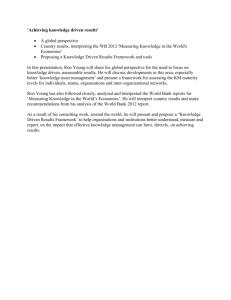Investigating-Opportunities-for-Collaborative
advertisement
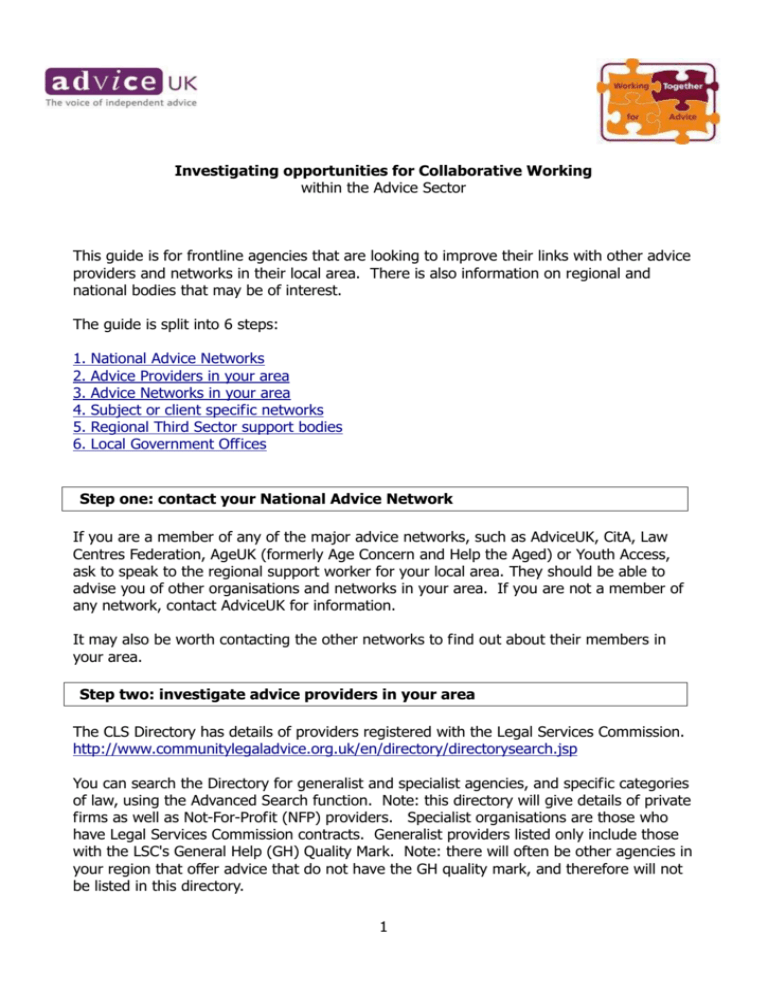
Investigating opportunities for Collaborative Working within the Advice Sector This guide is for frontline agencies that are looking to improve their links with other advice providers and networks in their local area. There is also information on regional and national bodies that may be of interest. The guide is split into 6 steps: 1. National Advice Networks 2. Advice Providers in your area 3. Advice Networks in your area 4. Subject or client specific networks 5. Regional Third Sector support bodies 6. Local Government Offices Step one: contact your National Advice Network If you are a member of any of the major advice networks, such as AdviceUK, CitA, Law Centres Federation, AgeUK (formerly Age Concern and Help the Aged) or Youth Access, ask to speak to the regional support worker for your local area. They should be able to advise you of other organisations and networks in your area. If you are not a member of any network, contact AdviceUK for information. It may also be worth contacting the other networks to find out about their members in your area. Step two: investigate advice providers in your area The CLS Directory has details of providers registered with the Legal Services Commission. http://www.communitylegaladvice.org.uk/en/directory/directorysearch.jsp You can search the Directory for generalist and specialist agencies, and specific categories of law, using the Advanced Search function. Note: this directory will give details of private firms as well as Not-For-Profit (NFP) providers. Specialist organisations are those who have Legal Services Commission contracts. Generalist providers listed only include those with the LSC's General Help (GH) Quality Mark. Note: there will often be other agencies in your region that offer advice that do not have the GH quality mark, and therefore will not be listed in this directory. 1 You could also contact your local authority to find out which agencies they fund to provide advice; use a Freedom of Information request if they are unwilling to provide details. Local authorities may often fund advice through several departments; it is worth contacting Adult and Social Care departments in addition to Voluntary Sector services. You could also contact your Primary Care Trust as they may fund advice services. Your local infrastructure organisation (LIO, also known as CVS or VCS organisations) may have a list of advice providers, although sometimes 'advice and information' is used in a much broader sense, as opposed to providing legal advice. Search on NAVCA’s website to find contact details for LIOs in your area: http://webdb.navca.org.uk/home.aspx Step three: find out if there are any advice networks in the area The Big Lottery Fund has had two funding rounds (beginning 2006 and 2009) aimed at establishing advice networks, called the AdvicePlus Programme. Contact your regional BLF office to ask if there are any in your local area. Contact your local LIO (see section 2) and ask about the old CLSP (Community Legal Services Partnership) – is it still running? CLSPs were forums set up by the Legal Services Commission for advice providers to discuss common issues and help build relationships between organisations. Step four : Find out if there are any subject or client specific networks Your first point of call should be your local LIO who should be able to advise you of local networks around particular subjects or clients. NCVO also has a Partner Zone, which will give you details of organisations that have registered their interest in collaborative working on Funding Central website. http://www.fundingcentral.org.uk/page.aspx?SP=Find_Partner You can also look at the following for areas which you currently work in, or are thinking about developing: BME groups / Immigration / asylum / refugees: your local LIO should have this information, including networks for Migrant Workers as well as established BME groups. If not, contact your local Racial Equality Council. Also, do a search on the internet. Also, Refugee Action, Refugee Council, Oxfam GB, Red Cross and IOM run projects across the country – check out their websites to see if you can link in. In addition you may want to investigate local providers of other services to clients, such as housing, e.g. http://www.refugeesupport.org.uk/services.html. Do a search on the internet for your particular location. Debt / Money Advice – contact your member network, who may have specific resources around money advice. Also, look at http://www.adviceuk.org.uk/projects-andresources/money-advice . There are details of Money Advice Groups in your area. 2 Discrimination – the BLF currently funds discrimination networks through the Working Together for Advice Project, http://www.asauk.org.uk/go/SubSection_78.html , until June 2010. Also Contact EHRC to see what they fund in your region. Disabilities - your local LIO should have details of local disability groups. It is worth checking on your Local Authority website for these, and also for ‘access groups’ which campaign for better access to goods and services. DIAL UK is the umbrella body for disability advice services; also contact Scope, United Kingdom Disabled People's Council (UKDPC), National Centre for Independent Living (NCIL). Disability Law Service can provide information on disability focused groups, organisations and networks in a particular region or locality: email national.development@dls.org.uk Shaping Our Lives is a network of user led organisations; there is lots of information on their website www.shapingourlives.org.uk. The Department of Health has been running a big programme to support user led disability organisations (ULOs) and the relevant part of their website gives details including the names of many organisations taking part in this programme. Employment / training / volunteering – your local LIO should have information on networks around these areas, or organisations that currently deliver that you may want to link in with. Financial Capability – join your regional financial capability forum. You may be able to access funding to deliver training sessions to your clients. For more information, look at http://www.adviceuk.org.uk/projects-and-resources/moneyadvice/financialcapabilityandmoneyguidance/financialcapability Financial Inclusion – contact your Financial Inclusion Champion to find details of networks and/or organisations involved in this work: http://www.transact.org.uk/page.asp?section=00010001000400250003 You may also want to look at Department of Work and Pensions’ Now Let’s Talk Money website. Health – AdviceUK have produced a useful report into making links with your local PCT. The discussion document and evidence report are available on the following page: http://www.adviceuk.org.uk/projects-and-resources/resources Housing – your local authority will have a network around preventing homelessness. Find out if you can join. Shelter may also be able to provide details of local networks around housing advice. Welfare rights – NAWRA run regional meetings for advisers doing welfare rights work. http://www.nawra.org.uk/Networks.htm 3 Step five: Regional Third Sector support bodies Contact your regional third sector support body (funded through Capacity Builders). They will have details of regional forums which may relate to the work your organisation does. Find out who attends these forums from your area – often it will be someone from your local LIO. Think about how you can get your views represented, even if you are unable to attend. Look on http://www.improvingsupport.org.uk and search in Resources by Region. There will be links through to the various forums under Signposting on the right hand side. Step six: Government offices / departments in your region Look at the Government office website for your region. Often there is interesting research and contacts there. ------------------------------------------------------------------------------------------------------------------------Produced in April 2010 by: Sarah Collins, Development Consultant for the North, AdviceUK Enhancing Frontline Advice Workstream Working Together for Advice Project (BLF funded) Tel: 0161 212 1581 Email: sarah.collins@adviceuk.org.uk 4
